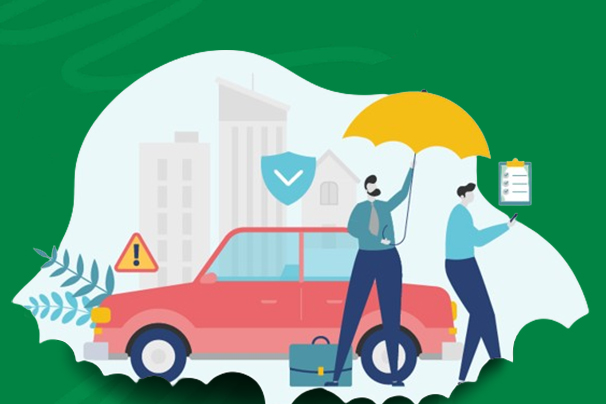Nonstandard auto insurance is a type of car insurance designed for drivers considered high-risk by insurance companies. These drivers may have a poor driving record, a history of accidents, or other factors that make them a higher risk for insurance providers. This insurance is also a way for these drivers to obtain the necessary coverage to drive legally and protect themselves and others on the road.

Although nonstandard auto insurance is more expensive than traditional car insurance policies, high-risk drivers must have the necessary coverage to protect themselves and others on the road. Not all insurance companies offer nonstandard auto insurance, so high-risk drivers must shop around for the best coverage and rates.
Some insurance providers specialize in nonstandard auto insurance and may offer more competitive rates than others. It’s important to compare policies and coverage options to find the best fit for your needs and budget.
How Does It Work?
When you apply for a car insurance quote, you’ll be required to provide personal details such as your age, address, driver’s license number, and history of insurance coverage. Additionally, you’ll need to provide information about your vehicle, including its make, model, age, and mileage. Based on this information, the insurance company will assess the level of risk you pose, which is the likelihood that they will need to cover the costs of any accidents or damage.
It’s worth noting that every insurance company has its way of evaluating risk, and not all insurance providers offer nonstandard coverage. However, once you have purchased a policy, nonstandard auto insurance is essentially the same as any other type of car insurance coverage, except for a higher premium. Despite the higher cost, it’s essential to have insurance coverage to protect yourself and others on the road, especially if you’re considered a high-risk driver.
Factors that could place you in the Nonstandard Category
Several risk factors of nonstandard auto insurance that could put you at risk include various risk elements, although there isn’t a precise definition for nonstandard auto insurance. Some of these risk factors encompass:
- Driving a high-performance or custom-built vehicle
- Owning a car with a “salvage title,” indicating significant damage or being declared a total loss
- Residing in an area with high rates of theft or vandalism
- Being a novice driver, often under the age of 25,
- Being an older driver
- Holding a foreign driver’s license
- Having gaps in your auto insurance history
- Carrying only the minimum required liability insurance in your state
- Incurring multiple accidents
- Filing numerous claims in a short timeframe
- Accumulating speeding tickets and other traffic violations
- Being convicted of driving under the influence
- Having a poor credit record
- Lastly, experiencing policy cancellations or non-renewals
This insurance typically comes at a higher cost and may lack some coverage that standard policies offer. For example, nonstandard coverage might not extend to individuals who occasionally borrow your vehicle. It’s crucial to understand these factors and their implications when considering this insurance to ensure you have the appropriate coverage for your specific circumstances.
Nonstandard vs. Standard Auto Insurance
Standard auto insurance refers to the minimum coverage required by your state. This typically includes bodily injury and property damage liability. Collision, comprehensive, medical payments, or personal injury protection. Also, uninsured motorist protection is common coverage, although some may be optional depending on where you live.
Nonstandard auto insurance, on the other hand, is designed for drivers who are considered at higher risk and are more likely to file a claim, resulting in the insurance company paying for damages.
Due to the increased potential for claims, insurance companies typically charge higher premiums for nonstandard auto insurance compared to equivalent standard coverage. Despite the higher cost, nonstandard auto insurance still includes many of the same types of insurance as standard policies, ensuring that high-risk drivers have the necessary coverage to protect themselves and others on the road.
Nonstandard Auto Insurance Companies
Meanwhile, Car insurance companies that cater to high-risk drivers and offer competitive rates along with SR-22 insurance are the top choices for those seeking nonstandard coverage.
Some of the insurers that sell nonstandard auto insurance are:
- Acceptance Insurance
- Alfa Insurance
- Bristol West (a division of Farmers)
- Dairyland
- Direct Auto Insurance
- Gainsco (now under State Farm)
- Geico
- The General
- Kemper
- Mercury
- National General (now part of Allstate)
- Progressive
- Lastly, Safe Auto
These companies specialize in providing this auto insurance to drivers who may have difficulty obtaining coverage elsewhere due to their higher risk profiles. By offering tailored policies and competitive rates, they ensure that high-risk drivers have access to the insurance they need.
Cost of Nonstandard Auto Insurance
Similar to standard insurance, insurance companies take into account various factors, such as your age, location, driving history, vehicle details, and more, when determining your insurance premiums.
Generally, nonstandard insurance premiums are higher than those for standard coverage. It is advisable to obtain quotes from multiple insurance providers to compare rates and coverage options, allowing you to select the most suitable policy for your specific requirements.
FAQs
Why would someone need Nonstandard Car Insurance?
Drivers may require nonstandard car insurance if they have a history of serious traffic violations, DUIs, poor credit, or lapses in coverage, making it challenging to insure them under standard policies. Nonstandard insurance caters to those perceived as higher risk by insurance companies.
How do you get a Nonstandard Auto Insurance policy?
Many major car insurance companies offer nonstandard insurance options, and some insurers specialize in providing coverage for risky drivers. It’s advisable to shop around, compare quotes, and consider companies that cater specifically to high-risk drivers to find suitable coverage.
What types of Coverage does it offer?
Nonstandard auto insurance offers various coverage options, including liability, collision, comprehensive, uninsured motorist, and personal injury protection. However, the specifics may differ from standard policies, and coverage may be limited or more expensive. It’s essential to carefully review the policy details and compare options to ensure adequate coverage.
Can Nonstandard Auto Insurance be converted to standard coverage?
Yes, nonstandard auto insurance can sometimes be converted to standard coverage as drivers improve their risk profiles. Factors such as maintaining a clean driving record, completing a defensive driving course, or having a continuous insurance history can help drivers qualify for standard coverage over time.
